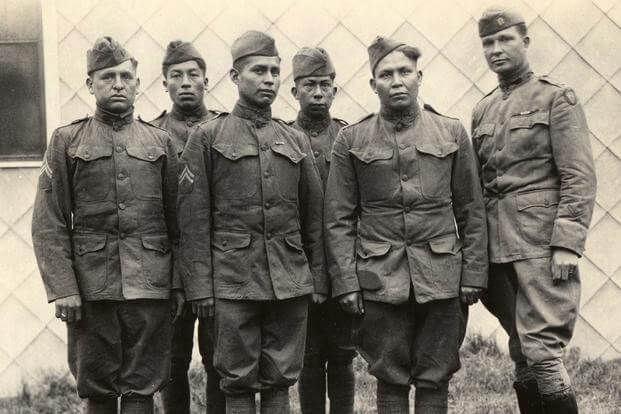
Choctaw telephone squad World War I. U.S. Army
How to register:
We offer two field trip scheduling options:
- Select a field trip from the Museum’s public event schedule
- Request to schedule a field-trip at a time that meets your group’s schedule
Audience:
All audiences. Content appropriate for Grades 6-12.
Goal: Learn how the commitment, challenges, and bravery of Native American Soldiers led to citizenship for all native people and helped lay the groundwork for voting rights.
Program Description:
Virtual Field Trips connect students to the Museum all without leaving their desks. During this field trip, students will engage with the Army’s history through artifacts, primary sources, and Soldiers’ Stories.
From the Revolutionary War and through present day, American Indians have proudly served the U.S. Army often without recognition or the benefits of citizenship. During World War I, nearly 12,000 indigenous Soldiers served in the armed forces with distinction. Their actions to protect the nation focused attention on disparities among indigenous Americans and paved the way for all indigenous people to enjoy the promise of American citizenship.
Objective: At the end of this lesson students, will be able to
- Recognize the service and sacrifice of Native Americans during World War I.
- Note the challenges indigenous Soldiers faced during World War I.
- Understand the importance of the Citizenship Act of 1924 and its impact on American society.
Guiding Question:
How did Native American military service during World War I contribute to the definition of citizenship?
Curriculum Connections
Common Core Standards
- CCSS.ELA-LITERACY.RH.6-8.2
Determine the central ideas or information of a primary or secondary source; provide an accurate summary of the source distinct from prior knowledge or opinions.
History and Social Science Standards of Learning for Virginia Public Schools
- Virginia and United States History
- VUS.10 The student will apply history and social science skills to analyze how the nation grew and changed from the end of Reconstruction through the early 20th century by
- A) analyzing the effects of westward movement and the admission of new states on the Indigenous peoples and the conflicts with the U.S. government, including, but not limited to the Battle of Little Bighorn and Wounded Knee.
- VUS.10 The student will apply history and social science skills to analyze how the nation grew and changed from the end of Reconstruction through the early 20th century by
Your message has been submitted.
